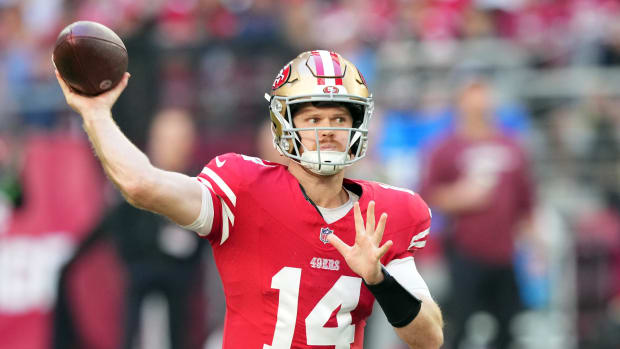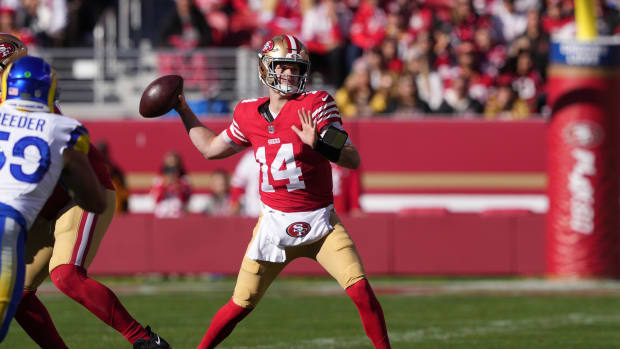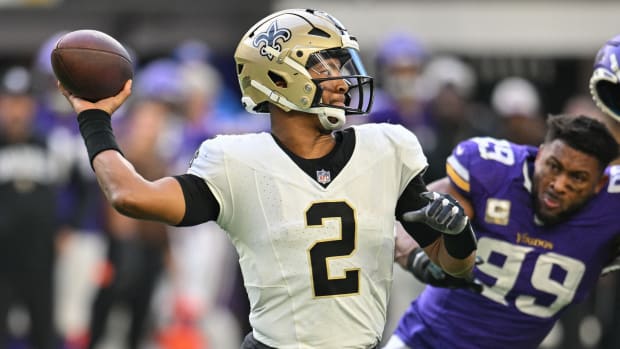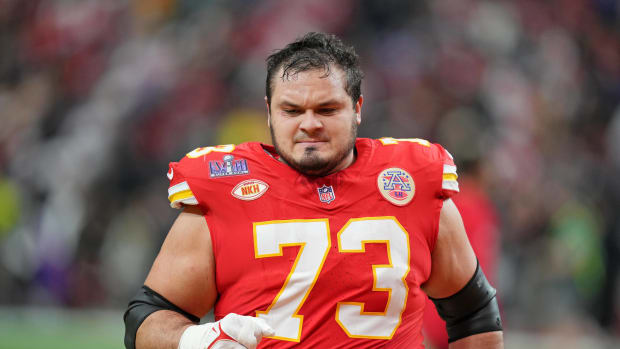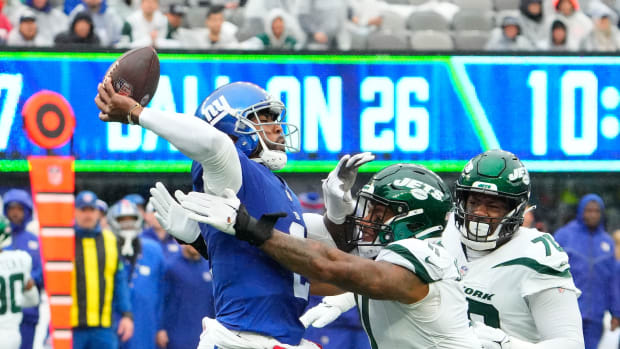
From Savior to Backup Plan
Kevin Kolb and Matt Flynn both brought promise to franchises, only to realize disappointment.
As the season kicked off last weekend, two quarterbacks who were each once designated as the future of two different NFL franchises did not play. Kevin Kolb and Matt Flynn present curious cases of well-paid and well-liked players each twice handed the keys to a franchise, yet were unable to keep their grip on the position. Let’s examine.
Kolb Korner
Although secure at quarterback at the time with Donovan McNabb, the Eagles used the 36th pick in the 2007 draft on Kolb, who waited patiently to play during a three-year apprenticeship. When I worked with the Eagles as a consultant in 2009, Kolb asked a few times about Aaron Rodgers at the Packers, seeing that as a similar situation. I told him that Aaron had frustrations and desperately wanted to play for three years but used every rep, practice, workout session and meeting to establish a quiet presence for future leadership. I knew that, like Aaron, team management felt very strongly about Kevin and that his time would come. And, like Aaron, it came when the team moved on from their signature player of over a decade.
2010
McNabb was traded; Kolb was anointed the starter and given a one-year contract extension—he was entering the final year of his rookie deal – with a $10.7 million signing bonus.
Kolb suffered a concussion in the Eagles’ opening game against the Packers. Michael Vick replaced him and, with play reminiscent of his scintillating days in Atlanta, became the team’s present and future starter. Following the season, the Eagles placed the franchise tag on Vick and put Kolb, their quarterback of the future six months earlier, up for sale.
2011
The Cardinals, desperately seeking a quarterback since Kurt Warner’s retirement, surrendered a second-round pick and cornerback Dominique Rodgers-Cromartie for Kolb. And, for the second consecutive year, before taking a snap as the team’s starting quarterback, Kolb was given a lucrative contract extension: a five-year, $63 million deal with a signing bonus of $10 million. Kolb played in nine games for the 8-8 Cardinals, as a foot injury and separate concussion allowed John Skelton to get on the field.
2012
When the Colts released Peyton Manning (it is still strange to write that) the Cardinals courted him aggressively. When it became clear Manning would choose Denver, the Cardinals had little choice other than to pay Kolb a $7 million option bonus required to retain him. Kolb played in six games for the 5-11 Cardinals, actually starting the season as the backup to Skelton, who won a preseason competition. A Week 1 injury to Skelton thrust Kolb back into the lineup, but Kolb's own season was ended with a rib injury.
2013
Set to receive another $2 million bonus payment this past March, the Cardinals ended their two-year relationship with Kolb and acquired Carson Palmer from the Raiders. Kolb signed with the Bills for two years, with a $1 million signing bonus and $1.65 million salary this season.
Kolb suffered what was described as a “severe” concussion in the preseason. Kolb’s concussion, one of several in his career, ended his season with the Bills, who placed him on injured reserve on August 30th. One now wonders if this could be the end of Kolb’s career.
If so, as the NFL settles concussion litigation with thousands of former players, the first and last games of Kolb’s career as an NFL starting quarterback would have ended with a concussion. Let us hope Kolb’s situation reminds us that this issue should not wane from the spotlight with litigation resolved.
Kolb made approximately $14.4 million from the Eagles, $30 million from the Cardinals and will make $2.65 million from the Bills for total earnings of over $47 million. In a league where teams usually dictate earnings to players, Kolb is the rare player without Pro Bowl credentials who tilted the leverage his way, taking full advantage of typically bleak landscapes of available quarterbacks. While his success on the field was mixed, he is a clear winner off it.
The Mighty Flynn
Week 1 Thoughts
1.I think any team in the league could have had Anquan Boldin, who had an epic performance against the Packers Sunday in a game of league heavyweights. All teams were aware of his staredown with the Ravens over a pay cut. Unless the Harbaugh brothers excluded other teams from getting in the game—which would have been bad business for the Ravens—Boldin was there for the taking for any team willing to offer more than a low sixth-round pick.
2. I think watching Jordy Nelson consistently beat Nnamdi Asomugha was interesting. Asomugha is making more money from the Eagles this year (a $4 million leftover guarantee) than Nelson is making from the Packers ($2.7 million).
3.I think, as I have said often, Chip Kelly was the biggest acquisition in the NFL this offseason. He is a change agent in a profession that often does things because, well, "that’s how they’ve always been done." Of course, it’s only one game, but his success to me is hardly surprising. More than anything else, Kelly is exceedingly smart, and intellectual horsepower is a powerful force.
4. I think the petulance shown by Mike Wallace over only catching one ball is all too predictable. High-priced free agent wide receivers thrown into new offensive systems are risky propositions that can enable players with any propensity to whine. It will be interesting to track the progress of players such as Wallace and Greg Jennings, especially compared to homegrown products such as Brian Hartline and Nelson.
5. I think it is interesting for Jerry Jones to accuse the Giants of faking injuries. There has been seething under the surface by Jones and Redskins owner Dan Snyder toward Giants owner John Mara, whom they feel led the charge toward severe cap penalties imposed on the Redskins and Cowboys last year for issues in the uncapped year. Jones and Snyder grudgingly accepted the penalties, but they will not easily let go of this issue with the Commissioner and with Mara.
Matt Flynn had a New Year’s to remember in 2012. With playoff position secured, the Packers rested Aaron Rodgers—among several starters—in a final regular season game against the Lions and Flynn, with an expiring contract, took full advantage: 480 yards passing and six touchdowns, both eclipsing longstanding team records.
Although the Packers briefly considered placing the franchise tag on Flynn—which would have seen Flynn making $14 million to Rodgers’ $8 million—they wisely decided against that, and Flynn entered the market.
2012
Flynn had friends in high places: both John Schneider, general manager of the Seahawks, and Joe Philbin, the new head coach of the Dolphins, liked Flynn from their time in Green Bay. And, after both tried and failed to woo Manning, Flynn became the consolation prize. He chose the Seahawks, signing a deal worth up to $26 million with $10 million guaranteed, and prepared to lead the team into the future.
Or not. Russell Wilson beat out Flynn and has become the signature player of a reborn franchise. Flynn, the splashy free agent acquisition months before, assumed the backup role he had with the Packers, although this time for $8 million.
2013
With the Seahawks' future secure in Wilson, Schneider dealt Flynn to former Packer colleague and Raiders general manager Reggie McKenzie. McKenzie promptly renegotiated Flynn’s deal to increase this year’s salary from $5.25 million to a guaranteed $6.5 million (while reducing next year’s number by a similar amount) to more accurately reflect a starting quarterback’s compensation this year.
Or not. After being an $8 million backup last year, Flynn is now a $6.5 million backup, benched in favor of another recent third-round pick, Terrelle Pryor.
Like Kolb, for two consecutive seasons, Flynn was handed the keys to two different NFL teams. And like Kolb, the teams took those keys back. Flynn will make $14.5 million in two years: that 2012 New Year’s Day game against the Lions proved quite lucrative.
***
Kolb and Flynn—solid people and consummate teammates with good work ethic—both did not live up to heralded arrivals with two different franchises. They are winners, however, in the business of football, something few NFL players are able to achieve in a financial landscape that typically favors franchises.
The recent chapters written on Kolb and Flynn serve as cautionary tales for NFL teams giving up valuable currency—trade consideration and contract compensation—for quarterbacks showing even modest signs of ascension. With unfavorable results from trades or contract upgrades for players with limited sample sizes such Kolb, Flynn or the BIlls’ Ryan Fitzpatrick—given a hefty contract extension after a few successful games in 2011—there will now be increased hesitation by teams on players such as these.
The other factor that will steer general managers in a different direction is the recent CBA’s reduced financial commitment to rookies, allowing teams to draft and develop quarterbacks without hamstringing the team’s future if the player does not produce. An increasing number of teams are—rightly, in my opinion—resisting the urge to acquire second- or third-tier veteran quarterbacks. Rather, they are trusting their scouts and are willing to grow with young and unproven players, even at quarterback.

































